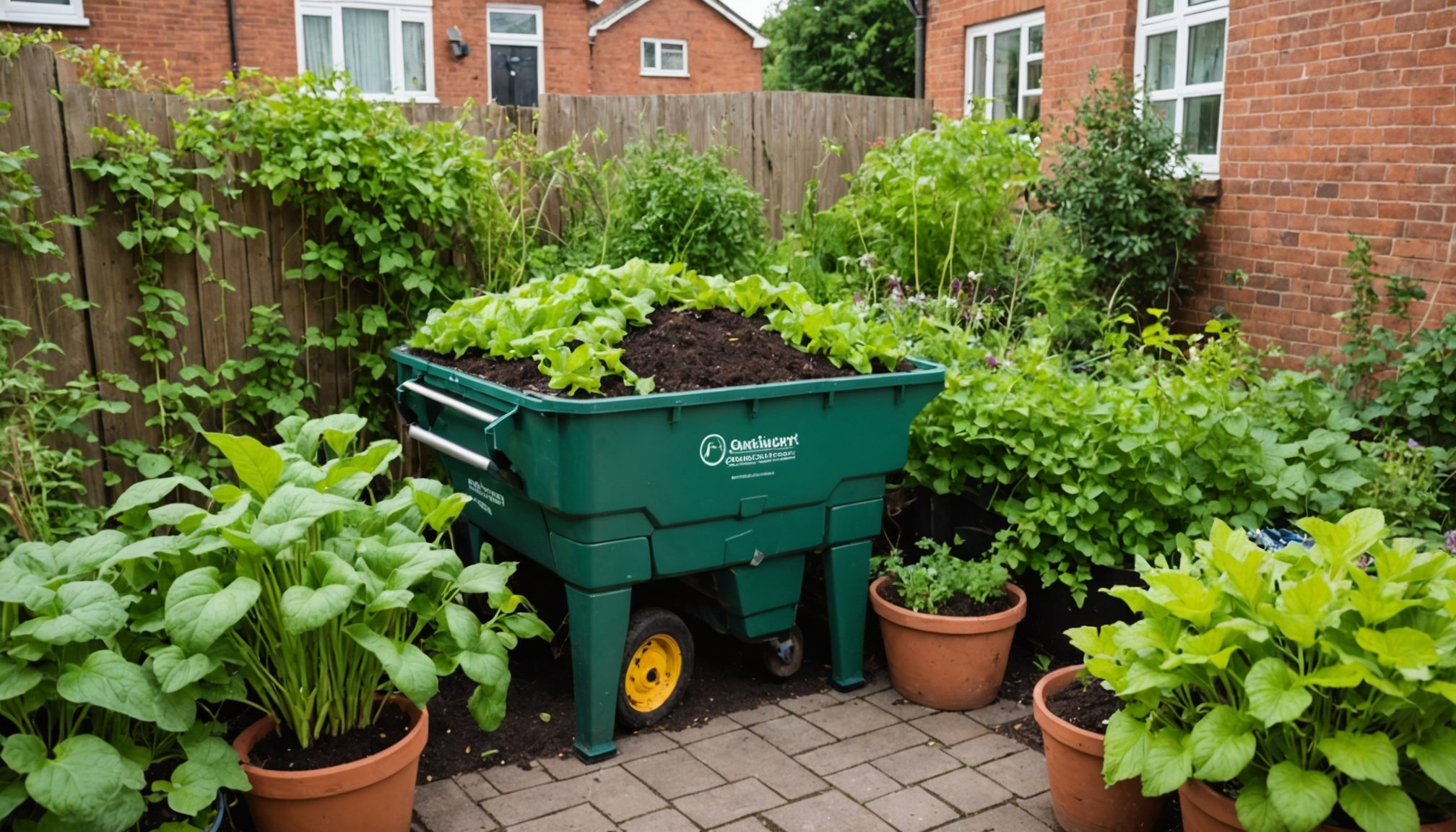Urban gardening in the UK offers a unique opportunity to reconnect with nature, even in small spaces. Implementing a sustainable composting system is key to enhancing your garden's health while reducing waste. This guide provides a clear, step-by-step process to help you build an effective composting solution tailored for your environment. Whether you’re a seasoned gardener or just starting out, transforming your garden begins here. Discover how composting not only nurtures your plants but also benefits the planet.
Understanding the Basics of Composting
Composting is a sustainable practice that transforms organic waste into nutrient-rich soil, playing a vital role in both environmental conservation and urban gardening. By diverting waste from landfills, composting reduces methane emissions, a significant contributor to climate change. This process not only benefits the environment but also enriches the soil, providing essential nutrients for plants.
A lire également : Ultimate Guide: Watering Your Succulent Garden in the UK Climate – How Often is Just Right?
In urban gardening, composting is particularly important. Urban spaces often lack the rich, fertile soil found in rural areas. By incorporating composting fundamentals, city dwellers can enhance soil quality, promoting healthier plant growth. This practice supports sustainable urban gardening by recycling kitchen scraps and yard waste, turning them into valuable resources.
A successful compost system relies on three key components: greens, browns, and moisture. Greens, such as fruit and vegetable scraps, provide nitrogen, while browns, like dried leaves and twigs, supply carbon. Balancing these elements is crucial for effective decomposition. Moisture is also essential, as it facilitates the breakdown of organic matter, completing the composting process.
Lire également : Thriving Citrus Trees in the UK”s Changing Climate: Tips for Success
By understanding these composting fundamentals, individuals can contribute to sustainable practices, reduce waste, and support urban gardening efforts. Whether in a small apartment or a larger urban space, composting offers a practical solution for eco-conscious living.
Essential Materials for Urban Composting
Navigating the world of urban composting requires understanding the right compost materials. These materials are classified into two main categories: green waste and brown waste.
Identifying Green and Brown Materials
Green materials, such as fruit and vegetable scraps, coffee grounds, and grass clippings, are rich in nitrogen. They play a crucial role in the composting process by providing the necessary nutrients for microorganisms to thrive. On the other hand, brown materials, like dried leaves, twigs, and cardboard, are carbon-rich. They help to balance the compost pile and ensure proper aeration. A successful urban composting system depends on maintaining a balanced ratio of these two components.
Sourcing Compost Materials in Urban Areas
Finding compost materials in urban settings can be challenging but not impossible. Urban dwellers can source green waste from kitchen scraps and community gardens. Brown waste can be obtained from local parks, tree trimmings, or even shredded newspaper. Creative sourcing strategies, such as collaborating with neighbours or local cafes, can enhance the availability of these essential materials.
Avoiding Common Composting Mistakes
One common mistake in urban composting is an imbalance of green and brown materials, leading to odour issues or slow decomposition. Regularly turning the compost pile and ensuring adequate moisture can prevent these problems. By understanding and sourcing the right compost materials, urban gardeners can efficiently transform waste into valuable soil enhancers.
Step-by-Step Guide to Building Your Compost System
Creating a composting system in an urban setting can be both rewarding and practical. For those with limited space, selecting the right compost bin is essential. Options like compact tumblers or DIY compost bins can fit snugly into small areas, making them ideal for urban gardening solutions.
Choosing the Right Compost Bin for Small Spaces
When space is at a premium, consider a DIY compost bin. These can be crafted from recycled materials like wooden pallets or plastic containers, tailored to fit your specific area. Alternatively, commercial tumblers are compact and efficient, offering easy rotation for aeration.
Step-by-Step Instructions for Assembling a Compost System
- Select a Location: Choose a spot with good drainage and partial sunlight.
- Prepare the Bin: If building a DIY compost bin, ensure it has adequate ventilation and drainage holes.
- Layer the Materials: Start with a layer of coarse materials for aeration, then alternate between green and brown waste.
- Maintain Moisture: Regularly check moisture levels, adding water if too dry or brown materials if too wet.
Tips for Maintaining Your Compost System in an Urban Environment
- Turn Regularly: Aerate the compost by turning it every few weeks.
- Monitor Odour: A well-balanced compost should have an earthy smell, not a foul odour.
- Utilise Vertical Space: Stack bins or use vertical planters to maximise limited areas.
Troubleshooting Common Composting Issues
Navigating the world of composting can sometimes lead to unexpected composting challenges. However, with the right problem solving strategies and urban gardening tips, these issues can be effectively managed.
Identifying and Solving Odor Issues
A common issue in composting is unpleasant odors. This typically arises from an imbalance of green and brown materials or inadequate aeration. To solve this, ensure a proper ratio of carbon-rich browns to nitrogen-rich greens. Regularly turning the compost pile can also enhance aeration, reducing odors.
Managing Pests in Your Compost Bin
Pests like flies or rodents may be attracted to your compost bin. To deter them, avoid adding meat or dairy products, which can attract unwanted visitors. Covering food scraps with a layer of browns, such as dried leaves or shredded newspaper, can also help. Secure lids and fine mesh screens can further prevent pest access.
Achieving the Right Moisture Balance
Maintaining the right moisture balance is crucial for effective decomposition. If the compost is too dry, decomposition slows down; if too wet, it may become anaerobic and smelly. Aim for a consistency similar to a damp sponge. Adjust by adding water or more browns as needed. With these urban gardening tips, you can address common composting challenges efficiently.
Benefits of Composting for Urban Gardens
Composting offers numerous benefits for urban gardens, significantly enhancing soil health and supporting sustainable gardening practices. By integrating compost into urban gardening, city dwellers can transform nutrient-poor soil into a fertile medium, fostering robust plant growth. The organic matter in compost improves soil structure, increasing its ability to retain moisture and nutrients, which is particularly beneficial in urban areas where soil quality is often compromised.
In addition to improving soil health, composting plays a crucial role in reducing waste. By converting kitchen scraps and yard waste into valuable compost, urban gardeners can significantly decrease the amount of organic waste sent to landfills. This reduction not only lowers methane emissions but also promotes a more sustainable lifestyle in densely populated areas.
The long-term benefits of composting extend beyond individual gardens, contributing to the overall health of the urban environment. As more individuals adopt composting, the cumulative effect leads to healthier green spaces and a reduction in urban heat islands. Moreover, composting encourages a community-focused approach to waste management and gardening, fostering a sense of shared responsibility for the environment. By embracing these composting benefits, urban gardeners can create thriving, sustainable spaces that benefit both people and the planet.
Additional Resources and Further Reading
Exploring additional resources can enhance your understanding of sustainable gardening and composting. These resources provide valuable insights and foster community connections.
Recommended Books and Articles on Composting
To deepen your knowledge, consider reading books like "The Rodale Book of Composting" and "Let It Rot!" These comprehensive guides offer detailed information on composting techniques and benefits. Articles from gardening magazines and websites provide up-to-date tips and innovations in urban gardening.
Online Communities for Urban Gardeners
Joining urban gardening communities online can be beneficial. Platforms like Reddit's r/composting and Facebook groups dedicated to sustainable gardening offer spaces to share experiences and ask questions. Engaging with these communities helps you stay informed about new practices and solutions.
Local Workshops and Events for Sustainable Gardening
Participating in local workshops and events can provide hands-on experience. Many cities host sustainable gardening workshops, offering practical skills in composting and urban gardening. These events are excellent opportunities to connect with like-minded individuals and learn from experts.
- Books: "The Rodale Book of Composting," "Let It Rot!"
- Online Communities: Reddit's r/composting, Facebook gardening groups
- Workshops: Local sustainable gardening events
These resources and communities support your journey towards effective and sustainable gardening.












